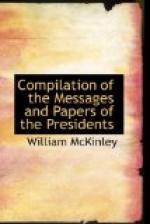The men who in the last three years have done so well in the East and the West Indies and on the mainland of Asia have shown that this remembrance is not lost. In any serious crisis the United States must rely for the great mass of its fighting men upon the volunteer soldiery who do not make a permanent profession of the military career; and whenever such a crisis arises the deathless memories of the Civil War will give to Americans the lift of lofty purpose which comes to those whose fathers have stood valiantly in the forefront of the battle.
The merit system of making appointments is in its essence as democratic and American as the common school system itself. It simply means that in clerical and other positions where the duties are entirely non-political, all applicants should have a fair field and no favor, each standing on his merits as he is able to show them by practical test. Written competitive examinations offer the only available means in many cases for applying this system. In other cases, as where laborers are employed, a system of registration undoubtedly can be widely extended. There are, of course, places where the written competitive examination cannot be applied, and others where it offers by no means an ideal solution, but where under existing political conditions it is, though an imperfect means, yet the best present means of getting satisfactory results.
Wherever the conditions have permitted the application of the merit system in its fullest and widest sense, the gain to the Government has been immense. The navy-yards and postal service illustrate, probably better than any other branches of the Government, the great gain in economy, efficiency, and honesty due to the enforcement of this principle.
I recommend the passage of a law which will extend the classified service to the District of Columbia, or will at least enable the President thus to extend it. In my judgment all laws providing for the temporary employment of clerks should hereafter contain a provision that they be selected under the Civil Service Law.
It is important to have this system obtain at home, but it is even more important to have it applied rigidly in our insular possessions. Not an office should be filled in the Philippines or Puerto Rico with any regard to the man’s partisan affiliations or services, with any regard to the political, social, or personal influence which he may have at his command; in short, heed should be paid to absolutely nothing save the man’s own character and capacity and the needs of the service.
The administration of these islands should be as wholly free from the suspicion of partisan politics as the administration of the Army and Navy. All that we ask from the public servant in the Philippines or Puerto Rico is that he reflect honor on his country by the way in which he makes that country’s rule a benefit to the peoples who have come under it. This is all that we should ask, and we cannot afford to be content with less.




